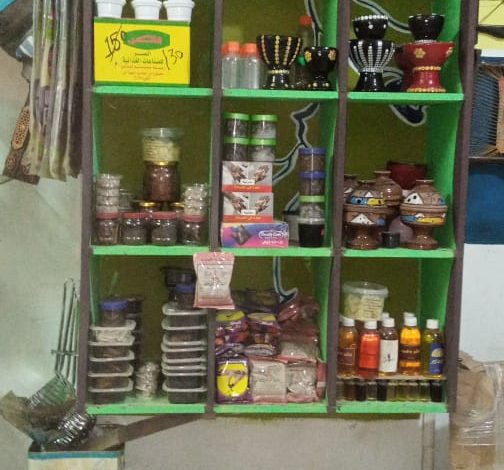Sudanese Products in Egyptian Markets…Burden of Living

Report by Nahid Oshi
The Arab Republic of Egypt was formed a safe haven for the Sudanese after the outbreak of war on April 15 of last year, as more than 16,000 Sudanese have crossed the border into Egypt since the outbreak of the war, in light of the presence of 4 million Sudanese fully residing in Egypt, according to the International Organization for Migration, while about 56% of them are stationed in the governorates of Cairo, Giza, Alexandria, Damietta, and Dakahlia.
All these numbers and more transferred a food culture and were able to create markets for Sudanese products in Egypt, which in turn were affected by the economic conditions and the successive rise of the dollar.
A Sudanese bakery owner points out that the price of a Sudanese loaf of bread has risen from one and a half pounds per piece to two pounds due to the rise in flour prices. Last month, a ton of flour did not exceed 16,500 pounds, while it has now risen to 24,000, while the price of a 50-kilo sack was 120 pounds and now it has exceeded 850 pounds, indicating that the increase is daily amid expectations of a rise in prices, while yeast prices stabilized at 70 pounds, while the prices of packaging bags rose, with the price of a kilo of bags reaching from 65 pounds to 100 pounds.
Below are the prices of oils Prices which rose from 65 pounds per liter to 90 pounds.
Fatima Abdel Moneim (a Sudanese woman residing in Cairo) complains that the prices of Sudanese products have escalated significantly during the recent period due to the war in and the cessation of imports from Sudan.
She said that the (plate) of kissra has risen to 12 pounds due to the increase in production inputs of flour and the difficulty of obtaining it due to the limited supply in the markets in addition to the high price of a kilo. As for the dakwa (traditional peanut butter) raised from 80 pounds to 100 pounds, with a clear increase in the waika (okra powder) prices where it exceeded 250 pounds per kilogram, 150 pounds for coriander, and 400 pounds for tea.
Critical economic conditions:
Resident Muhammad Nouh believes that the Sudanese families residing in Cairo who arrived after the war are living in very poor economic conditions due to the lack of a suitable income to match the subsistence requirements of housing, food, drinks and other supplies such as medicine and tuition fees for students.
In light of the continuous rise in prices in Egypt, families are now living in the situation can be described as unbearable, as they lost all the money they had in the absence of a stable income to help them live a decent life. Therefore, most of the immigrants from Sudan after the war are found working in marginal jobs in order to ensure that they meet their living requirements. However, this was not the solution in light of the continuous rise in prices, as life in Egypt has become an unbearable hell, especially for large families who came to Egypt after the war.
Youssef Hamed, a shop owner in Faisal City, points out that the price of tea reached 100 pounds per quart, while a pound of bean oil reached about 200 pounds, the price of a pound of sesame oil reached 300 pounds and 420 pounds for a pound of coffee. Youssef revealed the price of a kilo of henna, which reached 250 pounds and 120 pounds for the price of mahalabiya. Pointing to the lack of availability of original Zadna flour, as the price of a kilogram reached 55 pounds, indicating the increase in commercial activity and the great demand for the increasing number of Sudanese in Cairo following the succession of events and the continuation of the war in Sudan. He said that there is a demand for purchases despite the high prices.



